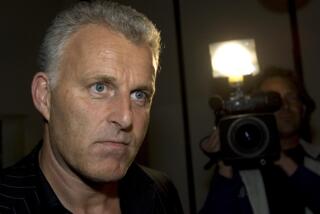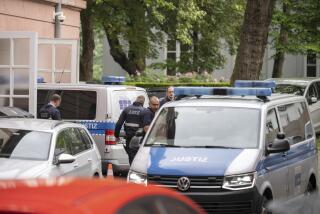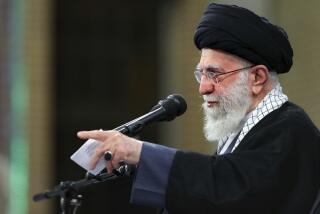Absent Hezbollah suspects on trial in killing of Lebanon’s Hariri
Four fugitives linked to the Shiite Muslim Hezbollah militia went on trial in the Netherlands in absentia Thursday, facing terrorism and murder charges in the 2005 assassination of former Lebanese Prime Minister Rafik Hariri.
The trial before the United Nations-affiliated Special Tribunal for Lebanon is largely symbolic, as the defendants have evaded capture for nine years and Hezbollah chief Hassan Nasrallah has boasted that they will never be caught.
But Hariri’s son and fellow former prime minister, Saad Hariri, praised the tribunal for pursuing the men suspected of having plotted the suicide bombing that killed his father and 21 others because of Hariri’s steadfast opposition to the presence of Syrian troops in Lebanon.
“We never thought that there would be, in the ranks of the Lebanese, people who could sell themselves to the devil and volunteer to kill Rafik Hariri and execute the most horrible terrorist operation with that enormous amount of explosives,” Saad Hariri said of the more than 2 tons of explosives used to blow up his father’s armored car and security convoy.
“Our presence here today is in itself a proof that our stance, since the first moment, and every moment, was and will continue to be: seeking justice, not revenge, punishment and not vengeance,” the victim’s son said in a statement reported by iloubnan.info, a Lebanese multimedia news portal.
The tribunal, located in a suburb of The Hague, the Dutch capital, in 2011 issued indictments against the four suspects: Mustafa Badreddine, Salim Jamil Ayyash, Assad Hassan Sabra and Hussein Hassan Oneissi. The men face charges including conspiracy to commit a terrorist act and committing a terrorist act of international homicide with premeditation.
Badreddine, suspected of being the overall controller of the deadly strike, has been associated with Hezbollah and its leaders as far back as the 1983 bombing of the U.S. Marine barracks in Beirut, according to biographical information published by the BBC.
Hariri’s killing reignited sectarian violence between Lebanese Shiites and Sunnis, and Syrian troops eventually withdrew from the posts they had occupied in the north of the country for 30 years.
Despairing of capturing the suspects and bringing them to trial, the special court decided in February 2012 to try them in absentia. A fifth suspect may be added to the case, tribunal authorities have said.
“This is a historic day for the Special Tribunal for Lebanon as it marks the transition from complex and difficult investigations to the new phase of trial,” tribunal spokesman Marten Youssef told Lebanon’s Daily Star newspaper. He said the trial of those suspected in Hariri’s killing was significant, in spite of the absence of the defendants, as it is “the first trial for a crime of terrorism in an international tribunal.”
In his opening statement, Prosecutor Norman Farrell said Hariri’s assassination was an attack that shocked the world and that the trial was necessary to expose the truth of the killings to Lebanese and the rest of the world.
Twitter: @cjwilliamslat
More to Read
Sign up for Essential California
The most important California stories and recommendations in your inbox every morning.
You may occasionally receive promotional content from the Los Angeles Times.











